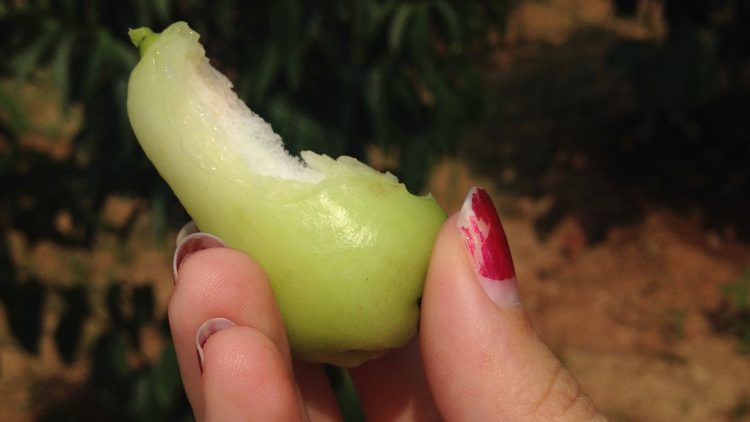
One of the many water apples I sampled. Photo credit: Tech in Asia.
I’m on a morning conference call with Back2basics father-daughter duo – founder and chief farmer Srinivasan Madhusudhan and idea cultivator (that’s her real job title) Bhairavi Madhusudhan – when I hear shouting. Srinivasan drops off the line.
Everything’s fine, Bhairavi assures me – it’s just that there’s been an elephant attack, and it’ll just be the two of us while the problem gets sorted.
About three weeks later, I’m sitting with Bhairavi as we’re driven on bumpy roads through greenery on the outskirts of East Bangalore. I only have time to tour two of Back2basics’ farms today, but both are experimental farms – open to 30-person groups every month to tour (and snack from) – and one is the one paid a visit by the elephants.
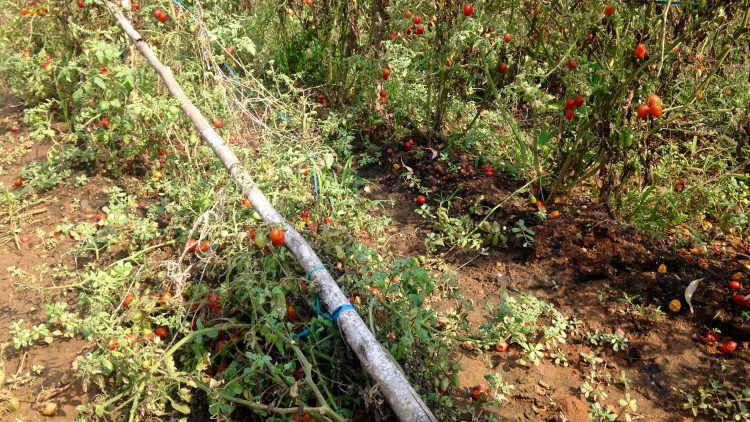
The elephants came to eat bananas and, finding they weren’t ripe enough, stomped on the cherry tomatoes. Then they took a bath in the water nearby, hung out a little more, and – as Bhairavi says – “bounced.” Photo credit: Tech in Asia.
I note immediately that the air is cooler and cleaner, even as the city haze is visible at a distance beyond the trees. I’m witnessing only a portion of Back2basics’ 180 acres of organic fruits and vegetables, and only a part of the over 450 workers there, but it’s still surprising to me when I hop out of the vehicle and see a small warehouse, with a couple handfuls of people sorting through vegetables by hand.
This group of people and some delivery trucks is what keeps Back2basics’s food growing and delivered – the company exports to Europe and Singapore, as well as multinational corporates in India and 45 organic stores in Bangalore. More recently, they’ve begun taking orders from around Bangalore and delivering straight to homes.
A walk in the garden
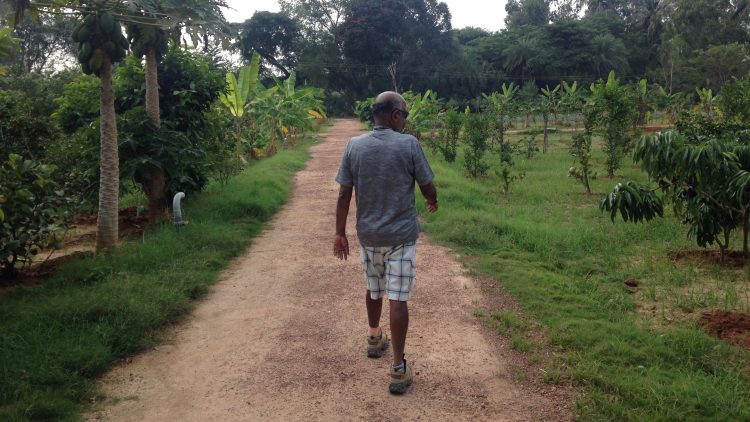
Srinivasan leads me through one of Back2basics’ experience farms. Photo credit: Tech in Asia.
Srinivasan meets us when we arrive and takes me through the fruit farm first. The first food I sample is actually growing right in front of my feet, so close to the ground that I mistook it to be part of the grass. He rips off a leaf for me. It’s minty when I take a bite. Spearmint, he tells me.
He ends up handing me more samples than I can eat at once, so one of the workers hands me a plastic bag to hold my food – the only plastic allowed on the farm is that used to carry the produce. Overhead, a white bird with impressive wingspan floats over the garden, along with a green bird that I haven’t seen before in Bangalore. Plenty of parrots hang out around the farm, Srinivasan tells me. They’re circling because he feeds them every morning, and his presence makes them think it’s time to eat.
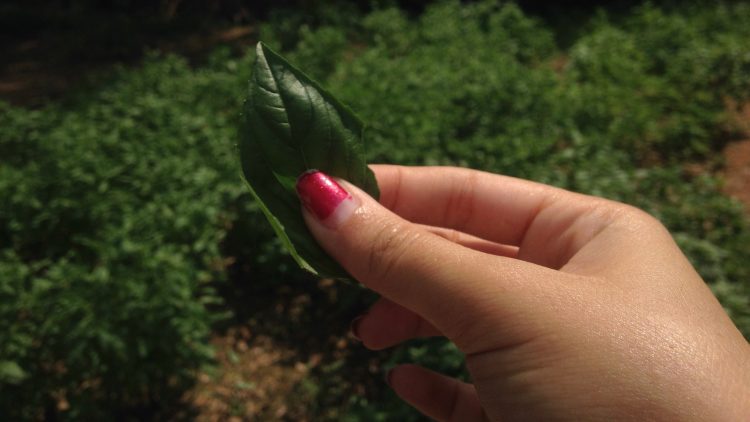
Sweet basil, straight from the source. Photo credit: Tech in Asia.
It’s hard to believe this guy was once senior vice-president at Airtel – he just seems so chill. His shorts-and-t-shirt look reminds me of what my dad used to wear on Saturdays when he’d work in the backyard.
Srinivasan’s career change is a huge part of Back2basics’ genesis. He collapsed in his office at Airtel one day and had to be hospitalized for reasons that included his diet. While recovering, to give himself something to do, he began growing greens on a 30 ft by 40 ft plot of land. A years-old memory of him and his wife watching a local vegetable supplier washing vegetables in sewage water made him think: How much healthier would people be if they grew their own produce? What if they knew exactly where it came from and the conditions it was grown in?
He enrolled in agriculture school and found, to his dismay, that his professors were valuable for agricultural theory but didn’t know how to put it into practice. His Airtel days behind him, he dropped out and became a self-taught farmer.
Seeds of fate
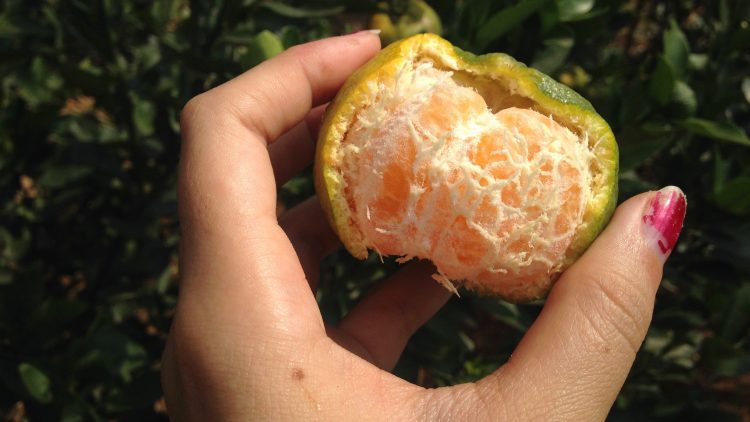
The skin was green, but it tasted great. Photo credit: Tech in Asia.
As I munch on oranges, Srinivasan explains that he sees his garden as his science lab. India, like most countries, isn’t keen on letting foreign agriculture into the country because of the danger to the country’s ecosystem. Back2basics, however, has one of 50 exceptions the country provides to those who are studying agriculture, so it’s common to see a plant from Israel growing next to a tree from Peru.
On the Back2basics site, exotic fruits and vegetables have their own order category, next to more common produce like bananas and pomegranates.
Later, as I walk through the vegetable garden, Bhairavi will show me the crop plots meant to test the soil, the crops grown together as complements, and the soil left “resting” to help it replace lost nutrients.
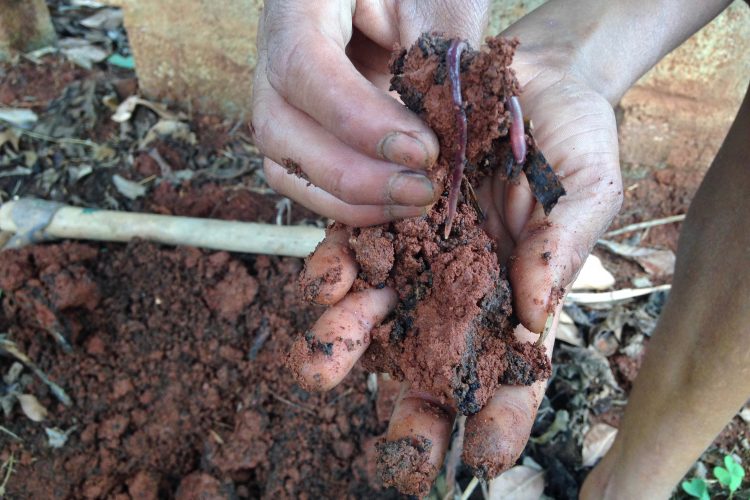
One of the farm workers digs up some of Back2basics’ self-cultivated earthworms. The worms are grown in a pit-like nursery, then transplanted to the crops’ soil. Photo credit: Tech in Asia.
Though not part of the original founding team, Bhairavi found her way into Back2basics when she came home for vacation from her work in Germany. The first Indian woman admitted to the Huntsman Program at UPenn, she found that the startup was struggling with predicting selling costs.
She volunteered to develop an algorithm that figured out benchmarks against competitors in organic and nonorganic spaces. “What got me excited was that in 15 days, we improved our profitability by 54 percent,” she tells Tech in Asia. “That to me was hugely exciting.”
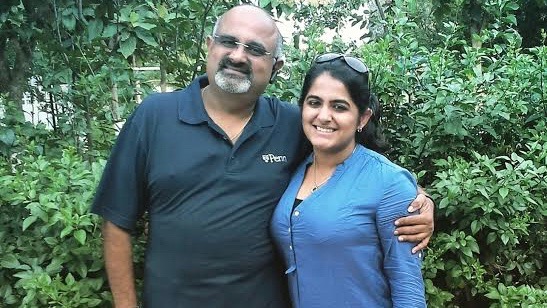
Srinivasan and Bhairavi Madhusudhan. Photo credit: Back2basics.
She adds that the potential at Back2basics looked great compared to her job, where she was at the bottom of the food chain and couldn’t see how the work she was doing was impacting the business. “I quit in 15 days, never looked back, no regrets,” she says. “I joined Back2basics full time.”
Back2basics has a call center where customers can call in with comments. Bhairavi herself takes an hour of calls a week. Customers have helped shape the startup – the reason that customers can now pick a two-hour window for food delivery is because a customer called and said that she couldn’t wait for her delivery all day due to her schedule. Bhairavi delivered the next batch of vegetables to her personally.
Sprouting organic

Back2basics sources its fertilizer – cow dung mixed with cow urine, which keeps it a liquid – from a local cow farm. In return, they give corn stalks and husks for the cows to eat in a traditional bartering system. No money is exchanged. Photo credit: Tech in Asia.
In recent years, organic farming has been gaining attention in India as a way to deal with land degradation and cancer-causing pesticides. While some do it to earn a living, others participate as a hobby and learn as they go. As of this year, the country even has a fully organic state, an effort that started in 2003.
A big problem for agriculture startups like Back2basics and Sakura Fresh is marketing to both customers and investors, something on which Bhairavi says the startup spends little effort. The new customer delivery service currently fills 200 orders a month.
Back2basics will launch its own line of cold-pressed juices next month in four flavors – two sweet, one savory, and one coconut-based.
This post On Bangalore’s beautiful outskirts, a farm startup wants to up India’s health, one belly at a time appeared first on Tech in Asia.
from Tech in Asia https://www.techinasia.com/back2basics-organic-farm
via IFTTT
No comments:
Post a Comment